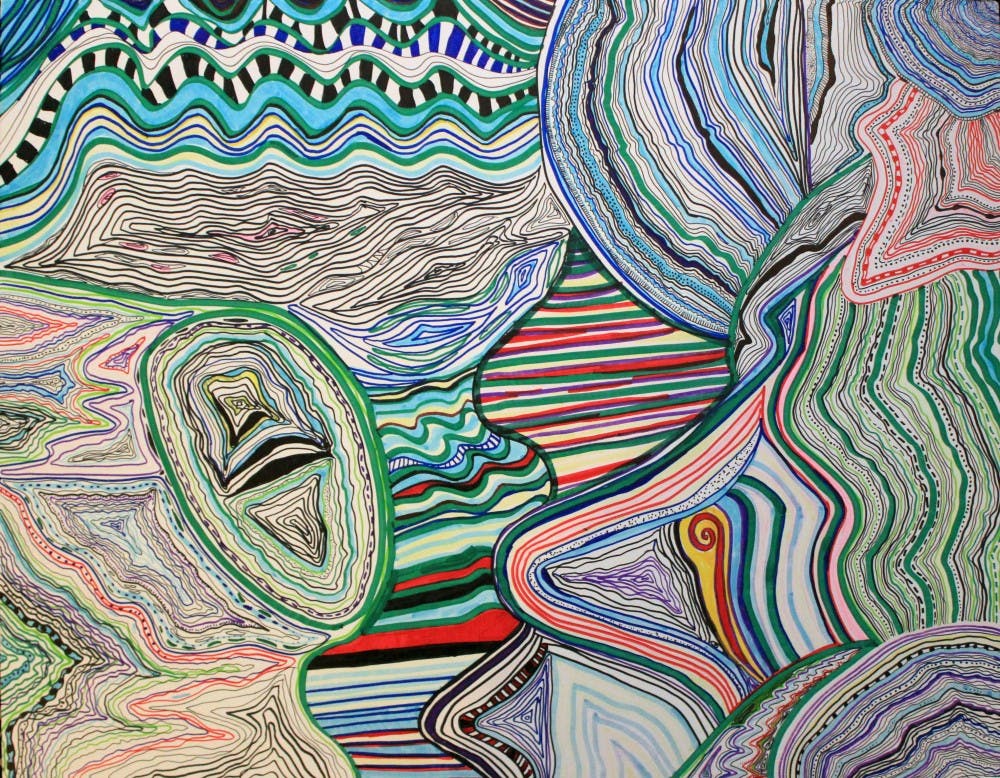Drawing by Rebecca Heilweil. Photo by Corey Fader
I made my first visit to CAPS two weeks into college. I had lost about ten pounds. I wasn’t quite anorexic or depressed, and certainly not suicidal. Avoiding food was simply a way of avoiding all–consuming stress. And besides, in a lot of ways, I was really happy to be at Penn.
But on random evenings, I would walk back to my dorm in inexplicable tears.
One night, alone in my room, I found myself weeping uncontrollably. My thoughts felt like nails screeching against a chalkboard. A grinding sense of nausea tumbling around my brain. I cried, desperate to get out of my head.
The next week, I walked into CAPS and requested an appointment at the front desk. Within half an hour, I had a psych consultation, but I would have to wait two weeks for an actual appointment.
I’d told myself I needed to see someone or else my lack of hunger was going to cause lasting, physical damage. In retrospect, I think I knew this had nothing to do with food.
The normalized and debilitating stress I’d justified for so long wasn’t actually me, but an anxiety disorder.
***
It took a while to get used to therapy. The awkward wait–time before my appointment, surrounded by students I never recognized. The way the therapist called my name. The daunting hallway to her office.
My only previous experience with mental illness involved conversations with my high school boyfriend. I rarely asked him to open up, which felt futile, awkward and sometimes inappropriate. When we talked, he explained it as an irrational panic, an inexplicable desire to “get home.” For me, his experience was the definition of anxiety disorder. If his brain was sick, mine certainly wasn’t.
At first, sessions made me nervous. I wanted a script, panicking to explain how I felt. I worried my stories sounded incoherent, that my therapist would get bored with me or that I seemed self–centered. I wondered if she thought I was vapid for discussing boys with as much passion as existential crises or home troubles. I regularly freaked out thinking she judged me for being a whiney–Ivy–League–white–girl who just “couldn’t handle the pressure.”
But these “worries,” as my therapist titled my stressors, exemplified my problem. She was getting paid to help me, and I was concerned only with entertaining her.
Sessions felt simultaneously too short and too long. I couldn’t figure out what was important or if anything was helping. Each silent second ignited panic. I couldn’t get my brain to empty itself, so I filled it with anxiety.
Discussing my situation with others, I found, was easier. After opening up about my panic attacks, my friends started changing the way they talked about mental illness and responded to mine.
I explained that when I seemed distant, it wasn’t because I didn’t care. When I was quiet, it was because my brain sometimes made my life more like a movie I could only watch. I was drowning in my own head.
They’re still learning about mental illness, and my experience in no way gives me all the answers.
When a boy walking me home from a party once confessed, “I’ve had suicidal thoughts in the past.”
I responded, “I could never kill myself. I’m not afraid of anything more than my mortality.”
“Me neither,” he replied. “That’s what made the feelings so scary.”
Only later that night, falling asleep, did I realize how inappropriate my response was.
***
After time, I learned to identify how mental illness manifests physically. For me, panic is an amalgam of migraines and pounding sounds in my head. An incessant recycling of my own thoughts. A prickly web of mental “stuff,” sticky like glue yet simultaneously foggy and incapacitating.
Eventually, my weekly CAPS sessions became a reprieve. In addition to a small daily SSRI dosage, my therapist forced me to spend time combing through the thoughts plaguing my head. I created a mental binary for myself. Healthy stress has reason. Anxiety doesn’t. With vocabulary to distinguish rational and irrational panic, I’m more in control.
Yet, I sometimes wonder whether facing my mental illness means I’ll lose what defines me. Anxiety—stress—drives me. Wasn’t my disorder just precaution, panic attacks simply emotion?
I’m constantly re–teaching myself that debilitating stress will make me unhealthy. It would make anyone sick.
If I started Penn attempting to find a new me, I’ve at least started. An opportunity to expand outwards, my first few months were also the chance to look inwards.
Life before freshman year is the control for learning who we are. College is the experiment.

